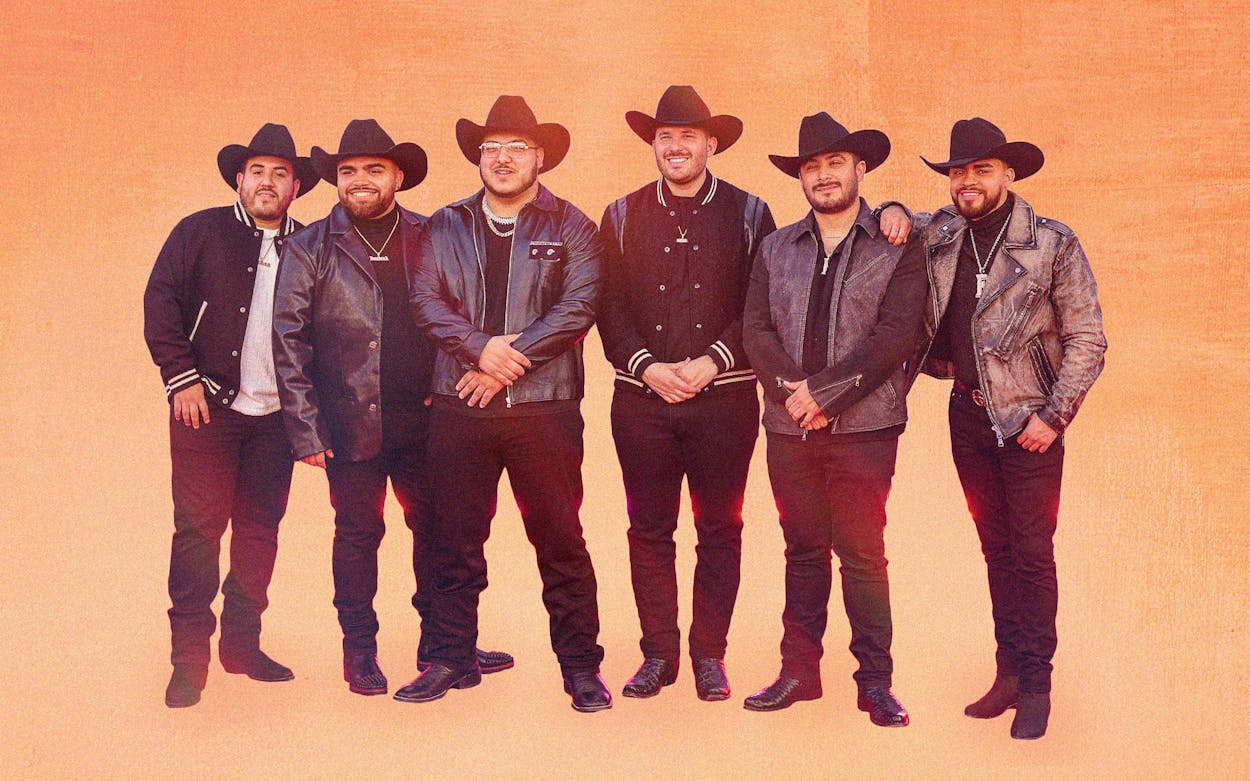There was a moment, between last October and this February, when it seemed as if everyone in the RGV and Mexico was listening to “No Se Va,” Grupo Frontera’s breakout hit. It blared out of speakers at gas stations in Laredo and from those Wi-Fi-supported jukeboxes in restaurants and diners in Monterrey. One could wait a bit on the corner and hear the chorus fade in and out from the open window of a pickup passing by.
The song went viral on TikTok, bringing overnight fame to the six friends from Edinburg behind it: Adelaido “Payo” Solis III, Alberto “Beto” Acosta, Brian Ortega, Carlos Guerrero, Julian Peña Jr., and Juan Javier Cantú. The earworm of a song is a cover of the original by Colombian pop-rock band Morat; Grupo Frontera reworked the tune’s original guitar arrangement with the more familiar (to Texans, at least) sounds found in tejano and cumbia. “No Se Va” rocketed onto the Billboard Hot 100, where it became the fifth-ever regional Mexican tune on the list; today it has almost half a billion streams on Spotify. In keeping with Grupo Frontera’s immense promise—and in preparation for the group’s first international tour—its debut album, which dropped last week, is named El Comienzo (The Beginning).
After “No Se Va” took off, music producer Edgar “Edge” Barrera got in touch. A Texan who has won twenty Latin Grammys and worked with heavy hitters such as Bad Bunny, Ozuna, and Shakira, Barrera began producing and writing hits for Grupo Frontera, including some with some of his past collaborators. These tracks (“Un x100to,” featuring Bad Bunny; “Tulum,” with Peso Pluma) blended different genres, including reggaeton and corridos tumbados (itself a mix between trap hip-hop and Mexican corridos), with the sounds of the different Mexican regional genres of tejano, cumbia, corridos, and música norteña.
Barrera’s imprint on El Comienzo’s eleven tracks is most notable in the songs that are heavily dosed with cumbia’s flair. Using a faster tempo and toying with ecstatic harmonies between tambores alegres, guacharaca, and trumpets, he transforms words of longing into optimistic declarations of a self-assured future. On the closing track, “Ojitos Rojos,” a collaboration with Argentinian cumbia group Ke Personajes, Solis and Emanuel Noir share the spotlight as the narrator, detailing their yearning to reunite with a lost love. “Dime que también lloran tus ojitos cuando preguntan por nosotros / Dime que piensas en mí aunque no esté ahí, aunque estes con otro” (“Tell me your little eyes also cry when they ask of us / Tell me you think of me when I’m not there, when you’re with someone else.”)
This spirit of experimentation and collaboration is present on perhaps the most exciting song on the album: “Las Flores,” a ballad inspired by eighties Mexican pop-rock featuring the Latin American band Yahritza y Su Esencia. Recalling the almost aquatic nature of classics from Los Bukis (there’s a moment between the prechorus and the hook in which the synths sound like underwater chimes), the song recounts a lover’s scorn and their subsequent regret for having been so open to someone new. It’s dramatic. It begs to be scream-sung with the windows down.
El Comienzo benefits from this line of experimentation, but it also shines in moments when it returns to a familiar texture. In songs such as “Me Gustas” and “Que Vuelvas” (featuring Carín León), the group returns to its conjunto norteño roots, with nods to the past of polka and corridos. Cantú’s accordion sounds breezy and triumphant, prancing upon the rhythm of Guerrero’s drums. Solis’s vocals generate their emotional weight from his bajo quinto (a guitar of ten strings typical in Mexican and tejano music). The narrator recounts the past, but the harmonies crescendo when we get to the present. As the lyrics drift off into hope for the future, the instruments fade.
Surprisingly, given the speed at which Grupo Frontera went from TikTok virality to full-on album release, El Comienzo doesn’t feel rushed. One can hear the history underlying the experimentation as the record returns to the past and shared culture of the borderlands. It’s an exciting debut album, from a group who is at the beginning of its story.






